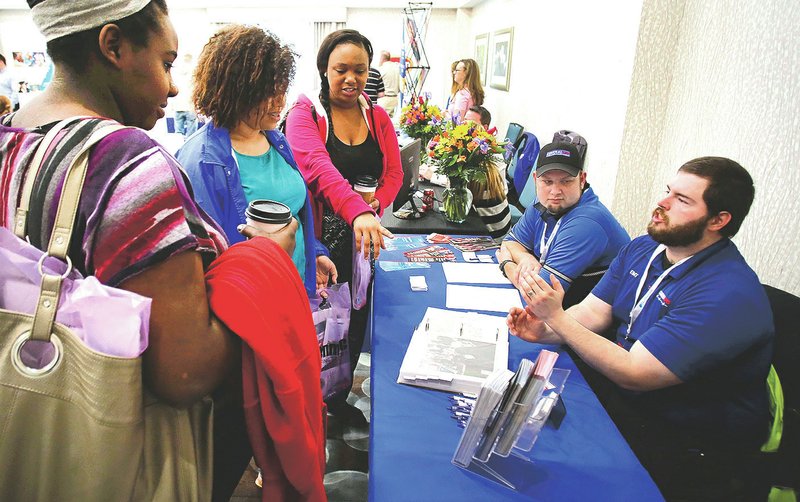FAYETTEVILLE -- Tyler Herrin isn't sure what he wants to do after he graduates from Fayetteville High School next month, but he hopes finding a job will help him discover a career path.
Herrin and about 65 classmates from the high school's ALLPS program attended the Fayetteville Chamber of Commerce's annual Job Expo on Friday. The Agee-Lierly Life Preparation Services center is the School District's alternative school.
Unemployment rates
Below are unemployment percentages for everyone older than 16 and those 16-19 for the month of February over the past 10 years.
Age 16-19Everyone
201515.25.8
201426.87.6
201328.17.6
2012218.5
201125.78.5
201029.28.1
200920.75.6
200818.35.6
200716.75.3
200621.75
Source: Arkansas Department of Workforce Services
"I'm looking for anything to make some money to help," he said. Herrin is considering taking classes at Northwest Arkansas Community College in Bentonville in the future.
The chamber opened the expo only to the students in the morning. Attendees heard from a variety of speakers giving job and interview tips before walking through 46 booths featuring employers and educational institutions.
Tracey Medlock, ALLPS program business instructor, said the goal is to give students some life experience dealing with employers.
"They can learn about resumes and interviews, but this gives them practice," he said.
Chung Tan, the chamber's director of economic development, said the goal of inviting students to the expo is to create a better quality workforce pool.
"We look at them as our pipeline," she said.
Finding a job in Northwest Arkansas can be challenging for young workers because of the area's tight job market, said Kathy Deck, director of the Center for Business and Economic Research at the University of Arkansas. A tight labor market means there are more jobs than workers.
February's unemployment rate was 4.4 percent in Northwest Arkansas and 5.8 percent statewide, according to the U.S. Bureau of Labor Statistics.
Statewide unemployment rate for residents 16 to 19 years old was 15.2 percent, according to the Arkansas Department of Workforce Services.
Deck said teen unemployment rates tend to be up to five times higher than the overall rate, and at 15.2 percent it's at its lowest point since 2007.
"The labor market has improved considerably," she said.
Teens must fight for entry-level jobs with older workers also looking for employment, Deck said.
"We don't want to make entry into the job market hard, but at the same time we want there to be a pathway for advancement," she said. "The goal of good, sustainable economic development is to provide careers all along the path."
Herrin lined up a job interview by mid-morning at Fayetteville's Chipotle Mexican Grill.
Chris Garrett, the restaurant's general manager, said he's looking for a handful of full-time employees. The restaurant serves alcohol, so workers must be at least 18 years old.
He said employees can work their way up the corporate ladder at Chipotle, adding 97 percent of the chain's managers started by rolling burritos.
Garrett points to himself as an example. He was looking for some part-time work about two years ago to help make ends meet. He was a teacher and coach for 14 years. He became a general manager 18 months later.
"I am a true success story," he said.
Krysta Williams, a senior, plans on attending the University of Arkansas next year to study in the pre-pharmacy program.
She has never had a job or interviewed before, and she said she wasn't sure what to expect.
"I'm excited and nervous at the same time," she said.
Williams hopes a speech class she took in high school will help her during interviews.
Taylor Tocci, a senior, said he has had three jobs and is working at Mary Maestri's in Springdale. He wants to become a firefighter and plans on taking EMT and fire sciences courses next year at NWACC.
He took the opportunity Friday to talk to people at the EMS table to see if his class plans would help him achieve his career goals.
"They said the EMS class would definitely help me out. They gave me some good information," he said.
Tocci said the money he earned at his jobs was nice, but he also learned the importance of responsibility and being punctual.
A study by the Employment Policies Institute reports the impact of entry-level work lingers for years.
Young adults who were in high school at the turn of the millennium and worked 20 hours per week earned 20 percent more money six to nine years after graduation compared to people who didn't work. People who were in high school in the late 1970s and early 1980s and worked 20 hours per week in their senior year earn 7 percent higher annual salaries than those who never worked.
"Entry-level jobs play an essential role in teens' career development and continues to pay benefits for decades," Michael Saltsman, Employment Policies Institute research director, said in the report.
NW News on 04/25/2015
